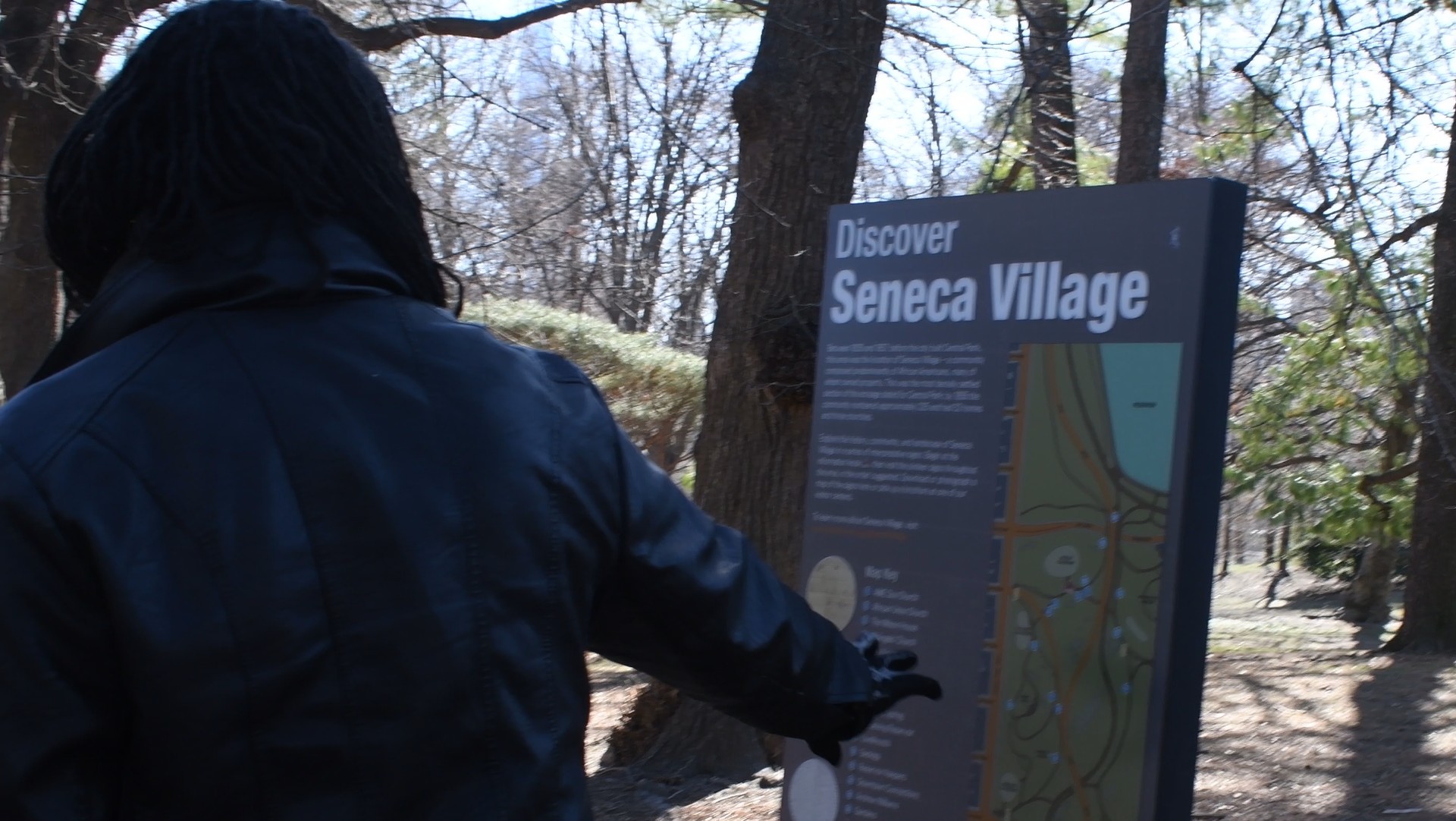Over 5.7 million people fled Ukraine since the war began, according to the United Nations data from May 5, which outstrips any movement of people in Europe since World War II. Most of them stay in the region, but some took the trip across the ocean and arrived in the United States.
While the promise of the “American dream” still attracts immigrants worldwide, it isn’t necessarily the case with Ukrainians. They already have a home, career, and life, and all of it is now being destroyed. Although they all had to escape their country for the same reason, their lives in the US don’t have the same trajectories. These are five different stories of Ukrainians of different ages and backgrounds adjusting to their new lives.
Living in a hotel room
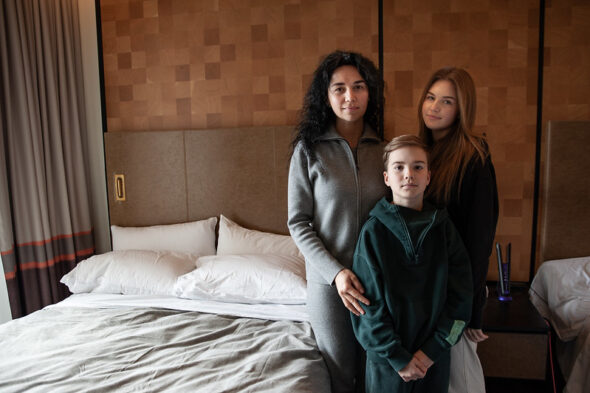
(from left) Anna, Zakhar, and Zlata Kuzmych in their bedroom in a hotel in Jersey City. March 28, 2022. Photo by Nikol Mudrová
When Russia invaded Ukraine on February 24, Anna Kuzmych and her son Zakhar, 10, were in Odesa, visiting Anna’s husband at a military base, where he was working as a soldier. So Zakhar’s older sister, Zlata, 16, experienced the first bombs falling on Kyiv while being home alone. She was terrified, and so was Anna.
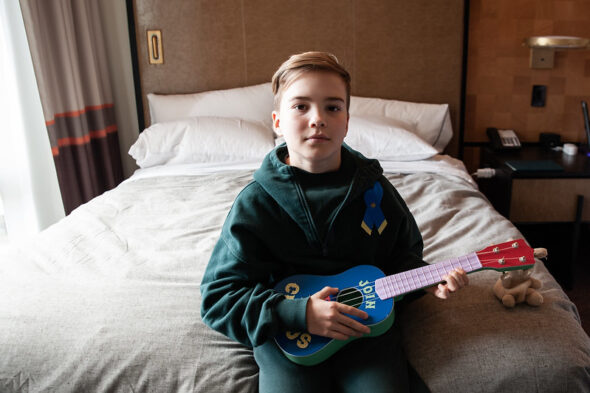
Zakhar Kuzmych with his ukulele in a hotel in Jersey City. March 28, 2022. Photo by Nikol Mudrová
Right away, Anna and Zakhar took a bus back home. Meanwhile, Zlata packed documents and necessary clothes, and Zakhar’s ukulele and her grandpa picked her up. Already in a car, they met with Anna and Zakhar and immediately headed to safer Western Ukraine.
“Then my husband called and said that the situation is not looking good and that we need to leave the country.” –Anna Kuzmych
After Anna’s husband’s urges, they all crossed borders with Hungary and split up. Anna’s dad is now in Teplice, the Czech Republic, whereas Anna, with her kids, traveled through Hungary and Italy and, on March 13, ended up in a small hotel room in Jersey City.
The hotel provided the room first as only a one-month help before the family found a temporary place to live. But it turned out, without any relatives in the US and only with tourist visas, it’s nearly impossible to get an apartment. And even though they applied for Temporary Protection Status, which could increase their chances of getting a new apartment and work authorization for Anna, it could take approximately six months before USCIS processes the application.
The hotel lets them stay for free even after the first month. However, the three live in a room with two king-sized beds, one desk with a chair, a bathroom, and a tiny anteroom with a wardrobe.
“My main task is to go for a walk with kids to get them the fresh air because our windows can’t be open. And we don’t have a kitchen, so finding food is more expensive.” –Anna Kuzmych
Anna supports Zakhar in learning to play on his ukulele that Zlata packed him at home to keep her kids’ lives as normal as possible. His favorite song is Obiymy (Hug Me) by Ukrainian rock band Okean Elzy, which speaks to resistance and perseverance in times of war.
“I’m physically here, but mentally in Ukraine. My husband and other family members are still there. We’re trying to help them morally, but not stress them and bother them too much.”-Anna Kuzmych
Struggling without healthcare
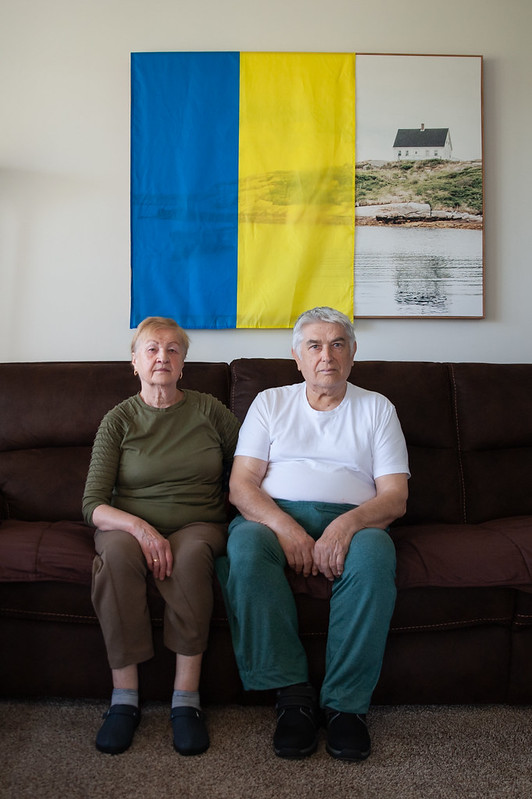
Lidia and Serhiy Stepanchenko in their daughter Natalya’s living room in Manalapan, New Jersey. April 15, 2022. Photo by Nikol Mudrová
Lidia, 82, and Serhiy, 84, Stepanchenko didn’t want to leave their hometown Vinnytsia, west of Kyiv. So two years ago, Serhiy bought two plots at a cemetery on the outskirts of Vinnytsia. When their daughter Natalya, who has lived in the US for over 25 years now, begged them to leave Ukraine, he joked that he is just going to crawl to the grave if anything happens. “I paid for these spots. I want to use them,” he said to her over the phone.
When eight missiles destroyed Vinnytsia’s airport on March 5, Natalya realized she needed to get them out no matter what. Serhiy is a bladder cancer survivor and diabetic, so he has a catheter and needs two types of insulin. And if a bomb was to destroy the refrigerator where he keeps his medication, he could die. So Natalya took action – she arranged her parent’s transport to Romanian borders in the town of Siret and flew there to pick them up.
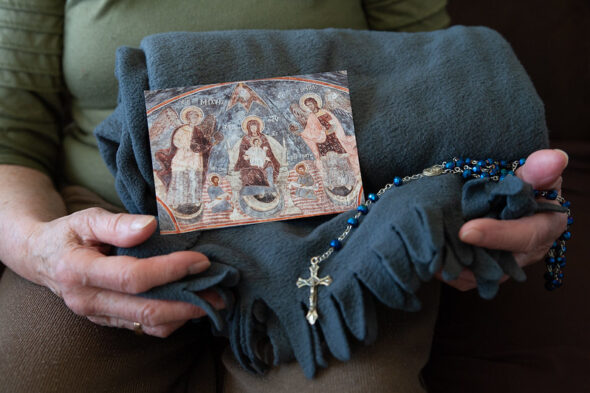
Lidia Stepanchenko holding a postcard, a necklace, and a blanket they got from volunteers at Romanian borders. April 15, 2022. Photo by Nikol Mudrová
Six days after the reunion, on March 15, they all finally landed at JFK airport in New York, thinking they had escaped all the problems. But a new one awaited at the airport. They didn’t know they could apply for refugee status only at US embassies and not after they entered the US and the immigration officer was able to give them only the B-2 visitor visas for six months.
“If it were just me, I would sit on the floor in his office and demand an immigration lawyer and fight for it. But I was afraid it was going to make it worse. And my parents were so tired.” –Natalya Schwarz
Most importantly, they need access to medical care, and refugee status would give them that. For now, they rely on free charity care with minimum month-long waiting for every appointment or lab. Serhiy brought with him two months of insulin supply, but the two months are almost over, and he still couldn’t get more insulin vials which are notoriously expensive in the US. Natalya is now trying to get someone to bring insulin from Ukraine.
The old couple also struggles with adjusting to living in a small two-bedroom apartment in Manalapan, New Jersey.
So far, Natalya keeps her parents busy. Serhiy knows how to sew, so his job is to adjust the new clothes to fit their needs. And Lidia is cooking. That is, however, sometimes contra-productive. They both crave comfort food, and therefore, that’s what Lidia cooks. But it’s mostly unhealthy, and with Serhiy’s diabetes and refusal to go on walks, he gained five pounds just in three weeks being in the US.
“They don’t want to be here, they want to go home, and they’re constantly worrying about the rest of the family in Ukraine.”-Natalya Schwarz
Parents stayed in Ukraine
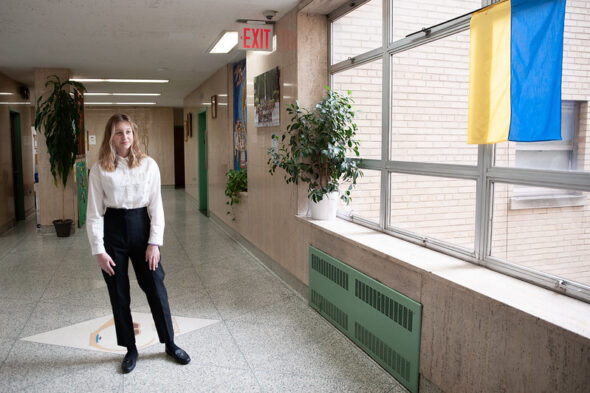
Viktoriya Luchkevych at St. George Academy in Ukrainian East Village, New York City. March 30, 2022. Photo by Nikol Mudrová
Viktoriya Luchkevych, 16, left her hometown Ternopil, leaving her parents behind. They both insisted on staying and helping the Ukrainian army fight against the Russians but wanted their daughter to be safe. So Victoriya took only two backpacks with necessities, made it to Moldavian borders, and traveling through Bucharest and Warsaw, she arrived at the final destination – her uncle’s house in Queens, New York.
“This was the first time I traveled through Europe, but I didn’t like it. I feel very bad. It’s hard to realize that war started in your country.”-Viktoriya Luchkevych
Fortunately, she has a permanent residency in the US, so she was able to enroll in St. George Academy, a private high school associated with the Ukrainian church in the Ukrainian East Village, and continue in her studies to potentially achieve her goal for the future – get into medical school. At home, she even used to practice sutures on a special simulator that she could not take with her across the ocean.
Although the St. George Academy is a hard school that strongly emphasizes academic performance, she handles the workload well. The Ukrainian education system is strong, and in most subjects, she is taking here, they’re repeating what she’s already learned back home. But the faster and more intense pace of New York City is something that she struggles with.
“It was really hard to get used to the subway. Queens is far away, so I got lost a couple of times on my way from school. I come from a small town where I can get to the center in ten minutes.” –Viktoriya Luchkevych
But the hardest of all is missing her parents. Though she speaks with them every day, and they’re reassuring her that they’re safe, she’s aware that they probably can’t tell her everything.
“I’m their child, so they must say to me they’re ok.” –Viktoriya Luchkevych
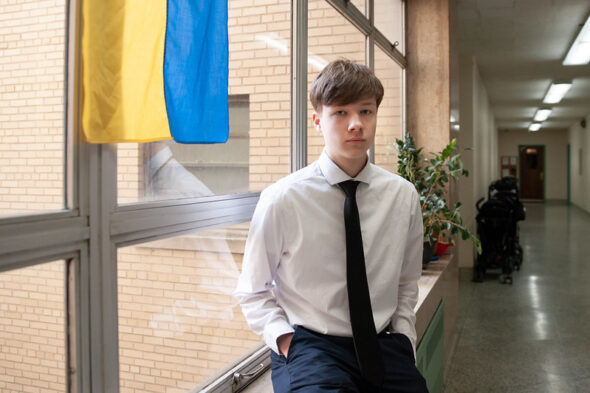
Maksym Kosar at St. George Academy in Ukrainian East Village, New York City. March 30, 2022. Photo by Nikol Mudrová
In a similar situation is her one-year-older classmate at the St. George Academy, Maksym Kosar. He also came to the US by himself from Irano Frankivs after his dad drove him to the Polish borders and returned to join the Ukrainian territorial defense force.
Maksym now stays with his mom, who moved to New York City seven years ago. She was actually the one who urged him to pack his documents, meds, water, some winter clothes, and electronics a week before the invasion started just in case something happens.
“My dad loves Ukraine and wants to save it. I speak with him a couple of times a day. I hope he’s safe.” –Maksym Kosar
In Ukraine, Maksym attended a public school specializing in English and science as he was preparing himself to come to New York and St. George for his 12th grade and apply for a US college.
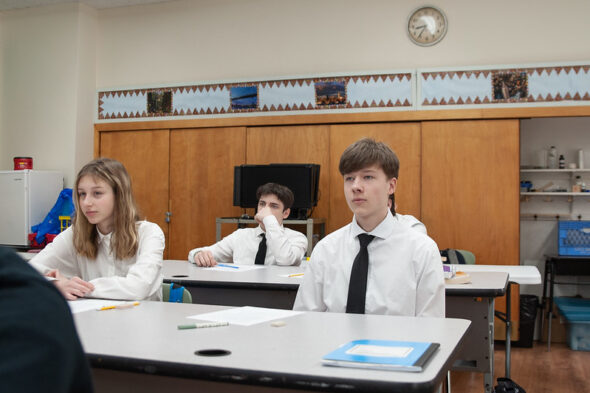
Viktoriya Luchkevych and Maksym Kosar in a chemistry class at St. George Academy in Ukrainian East Village, New York City. March 30, 2022. Photo by Nikol Mudrová
However, since he joined the academy earlier than expected, he’s still finishing his classes in Ukraine online on weekends while going to St. George during weekdays. And though his schedule is quite busy, he still finds time to talk to journalists about his experience to spread awareness about what is going on in his country.
“I’m doing great in terms of that everyone is really warm. And I’m trying to do everything I can to express my opinion on the war.”- Maksym Kosar
Tackling time difference while working in Kyiv from Philadelphia
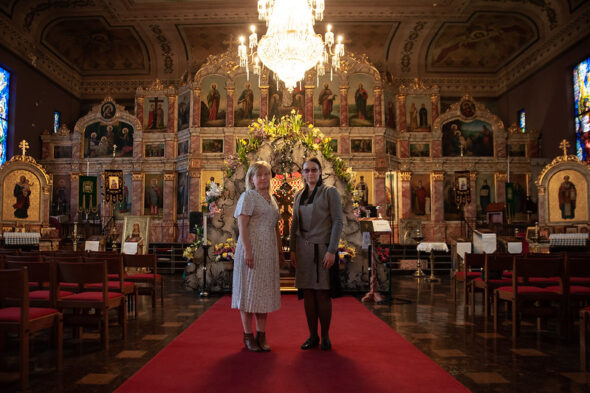
(from left) Alla Pukhteska and Veronika Matviienko in the St. Nicholas Orthodox Cathedral in Philadelphia. April 23, 2022. Photo by Nikol Mudrová
A few months before the Russian invasion started, Bishop Luke from the St. Nicholas Orthodox Cathedral of Philadelphia visited the Volodymyr’s Cathedral in central Kyiv. He told the church’s members, Alla Pukhteska, 42, and Veronika Matviienko, 50, that he believed the war was coming and that they could count on his help.
And when the Russians attacked Kyiv, Alla called Veronika to ask if she knew any other way out, and she said no. So they began arranging their transport to Poland, where they planned to apply for a visa.
“We were afraid of tanks and shootings nearby, and when we saw elements of bombs falling from the sky on houses, it was our ultimate internal obligation to escape. Either you escape, or you die.”- Alla Pukhteska
When they arrived in Warsaw, they contacted Bishop Luke, who helped them with the application process. After three weeks of waiting, they received visitor visas and flew to JFK, where Luke picked them up and drove them to his church in Northern Liberties in Philadelphia.
“Of course, it would be desirable to be able to stay here more than six months, because we’re not sure about the situation. As for last week (mid-April), the Darnytskyi District we’re living in was bombed. But visitor visas were the most suitable for the immediate way of escape.”-Alla Pukteska
They’re now staying at the rectory near the St. Nicholas Orthodox Cathedral, still maintaining their jobs in Kyiv. Alla is a theology and administrative law teacher and Veronika choir director at Orthodox Theology Academy, and they still lecture and consult with their students using Zoom. With the seven-hour difference from the Ukrainian time zone, they’re teaching early in the morning, and because Veronika teaches singing, it usually wakes up the rest of the house.
Apart from Zoom classes, they both help in the church during God’s services and arrange church events, such as the Orthodox Easter celebrations a few weeks back.
“It’s the internal feeling of protection. We don’t have to be afraid of bombs falling on us. But personally, when a car is starting near me, I am still scared. Of course, there are also biological aspects impacting us because of the time difference.”-Veronika Matviienko
This is only temporary
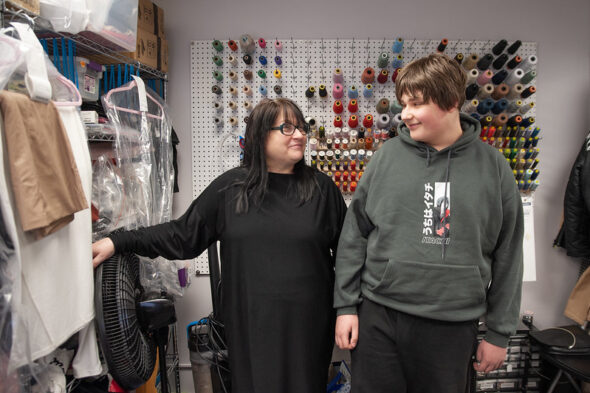
Nadia Andreychenko and Timur Plitka in Nadia’s daughter Ira Lysa’s fashion studio in Jersey City. April 10, 2022. Photo by Nikol Mudrová
In the first week of the war, Nadia Andreychenko, 56, feared how the situation in her hometown Ternopil could evolve. She lives in an old building with only a tiny basement that provides basically “zero protection” if bombs were to start falling. So she felt that the only thing she needed to do was protect her family and her youngest son Timur, 13.
They took just a backpack with some clothes, electronics, and documents and went through Lviv to Poland, where they spent two weeks in Wroclaw and Warsaw with no clue when they were coming back home.
“At that moment, you realize that nothing matters. You don’t need anything, just to keep your kid alive.”-Nadia Andreychenko
However, they knew that they needed to apply for visas and head to the United States. One of Nadia’s daughters, Ira Lysa, lives in Jersey City, and they can stay with her, hoping that they will be able to move back home after the six months that visitor visas allow them to remain in the country.
With the time difference, Timur can’t attend his Ukrainian school online, so he uses his free time to explore New York City, visiting all the famous places he knew from movies. It’s his first “trip” abroad, and so far, it feels more like a holiday for him.
On the contrary, his mom misses home, friends, and family. At home, Nadia helped Ira with opening a fashion factory in Ternopil. Ira is a fashion designer and building a fashion brand and opening a factory in her hometown was always her dream. But shortly after they bought sewing machines and other equipment, the war started, and they had to close the business for now.
Nadia spends time mostly with her son and daughter in the US, not really trying to make new friends.
“Timur enjoys the time here. But I miss my home, and I feel like I’m here only temporarily.”-Nadia Andreychenko
